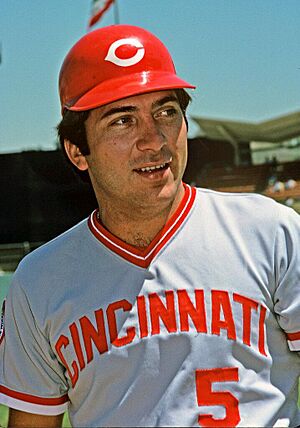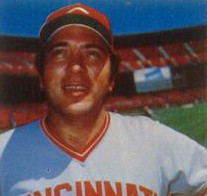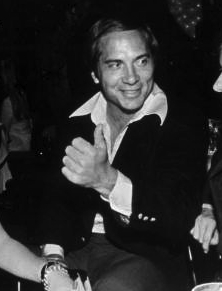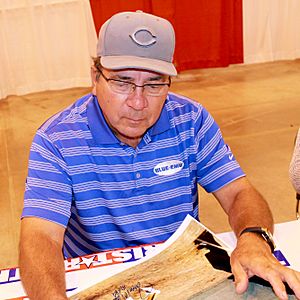Johnny Bench facts for kids
Quick facts for kids Johnny Bench |
|||
|---|---|---|---|

Bench with the Cincinnati Reds in 1976
|
|||
| Catcher | |||
| Born: December 7, 1947 Oklahoma City, Oklahoma, U.S. |
|||
|
|||
| debut | |||
| August 28, 1967, for the Cincinnati Reds | |||
| Last appearance | |||
| September 29, 1983, for the Cincinnati Reds | |||
| MLB statistics | |||
| Batting average | .267 | ||
| Hits | 2,048 | ||
| Home runs | 389 | ||
| Runs batted in | 1,376 | ||
| Teams | |||
|
|||
| Career highlights and awards | |||
|
|||
| Induction | 1989 | ||
| Vote | 96.4% (first ballot) | ||
Johnny Lee Bench (born December 7, 1947) is a famous American former professional baseball player. He played his entire career, from 1967 to 1983, with the Cincinnati Reds. Johnny was mainly a catcher, a key position in baseball.
He was a leader of the Reds team known as the Big Red Machine. This team was super strong in the mid-1970s. They won six division titles, four National League championships, and two World Series titles.
Johnny Bench was an amazing player both when hitting and when playing defense. He was chosen for the All-Star team 14 times. He also won the National League Most Valuable Player (MVP) award twice. He led the National League in home runs two times and in runs batted in (RBI) three times.
When he retired in 1983, he held the record for most home runs hit by a catcher. He was also the first catcher ever to lead the league in home runs. In 1970, he hit 45 home runs, which was a record for catchers in the National League. His 389 home runs and 1,376 RBIs are still the most in Cincinnati Reds history.
On defense, Bench won the Gold Glove Award ten times. He was great at working with pitchers and had a very strong and accurate throwing arm. He caught 100 or more games for 13 years in a row. In 1989, he was inducted into the Baseball Hall of Fame. Many people, including ESPN, call him the greatest catcher in baseball history.
Contents
Early Life and Baseball Dreams
Johnny Bench was born and grew up in Oklahoma. He is part Choctaw Native American. In high school, he played baseball and basketball. He was also the best student in his class.
His father told him that the quickest way to become a major league player was to be a catcher. This advice helped shape Johnny's career.
Starting His Professional Career
Drafted by the Reds
When Johnny was 17, the Cincinnati Reds picked him in the 1965 amateur draft. He was the 36th player chosen overall. He then played for minor league teams like the Buffalo Bisons in 1966 and 1967.
In 1967, he hit a grand slam against Jim Palmer. Palmer was a famous pitcher who would not give up another grand slam in his 19 years in the Major Leagues.
Playing for the Cincinnati Reds (1967–1983)
Johnny Bench joined the Reds in August 1967. He didn't hit very well at first, but his defense was amazing. His strong throwing arm impressed many, including Hall of Famer Ted Williams. Williams even signed a baseball for Bench, predicting he would be a "Hall of Famer for sure!" This prediction came true 22 years later.
In 1968, at just 20 years old, Bench had a fantastic first full season. He won the National League Rookie of the Year Award. He batted .275, hit 15 home runs, and had 82 RBIs. This was the first time a catcher had won this award. He also won the 1968 National League Gold Glove Award for catchers, another first for a rookie.
During the Vietnam War, Bench served in the United States Army Reserve. He was part of the 478th Engineer Battalion. Several of his teammates, like Pete Rose, were also in this unit. In the winter of 1970–1971, he joined Bob Hope on a USO tour to entertain troops in Vietnam.
The Big Red Machine Years (1970s)
Winning MVP Awards
In 1970, Bench had one of his best seasons. At 22, he became the youngest player to win the National League Most Valuable Player Award. He batted .293, led the National League with 45 home runs, and set a team record with 148 runs batted in. The Reds won their division that year. They swept the Pittsburgh Pirates in the playoffs but lost the World Series to the Baltimore Orioles.
Bench had another great year in 1972, winning his second MVP Award. He led the National League with 40 home runs and 125 RBIs. This helped the Reds win their division again and reach the World Series. One of his most exciting home runs was in the final game of the playoffs. He hit a solo home run in the ninth inning to tie the game. The Reds then won later in the inning. However, they lost the World Series to the Oakland Athletics in seven games.
After the 1972 season, Bench had surgery on his lung. Even though the problem was not serious, he later said he was never quite the same player after that. He still played very well but didn't hit 40 home runs in a season again.
In 1974, Bench led the league with 129 RBIs and scored 108 runs. He was only the fourth catcher in baseball history to have over 100 runs and RBIs in the same season.
World Series Championships
In 1975, the Reds finally won the World Series. Bench hit 28 home runs and had 110 RBIs that year. Cincinnati swept the Pirates in the playoffs. Then, they beat the Boston Red Sox in an exciting seven-game World Series.
Bench had some shoulder problems in 1976, which affected his hitting. But he played incredibly well in the postseason. In the World Series, the Reds faced the Yankees and their star catcher, Thurman Munson. Bench was amazing, hitting .533 with two home runs. The Reds swept the Yankees in four games, and Bench was named the Series' Most Valuable Player (MVP).
Reds manager Sparky Anderson was asked to compare Bench to Munson. He famously said, "I don't want to embarrass any other catcher by comparing him to Johnny Bench." Bench bounced back in 1977, hitting 31 home runs and 109 RBIs.
Later Career and Retirement
In the last three seasons of his career (1980-1983), Bench played less at catcher. He mostly played first or third base. On September 17, 1983, the Cincinnati Reds held "Johnny Bench Night" at their stadium. He hit his 389th and final home run that night. He retired at the end of the season when he was 35 years old.
Career Highlights and Records
Bench finished his 17-year career with 2,048 hits, a .267 batting average, 389 home runs, and 1,376 RBIs. All of these were with the Reds. He held the record for most career home runs by a catcher for a while. He still holds the Major League record for the most grand slam home runs by a catcher, with 10.
He won 10 Gold Gloves and was an All-Star 14 times. He also won two Most Valuable Player Awards. Bench was known for his excellent defense, with a .990 fielding percentage as a catcher. He also caught 118 shutouts during his career.
Bench helped make the hinged catcher's mitt popular. He started using it after a thumb injury. This mitt allowed him to keep his throwing arm safe when catching pitches. Soon, this type of mitt became standard for catchers.
Life After Baseball
Johnny Bench has been married five times. He has sons named Bobby Binger Bench and two younger sons. Bobby works in Cincinnati on Reds broadcasts.
Bench has appeared on TV shows and hosted a baseball show called The Baseball Bunch. On this show, kids learned baseball from Bench and other famous players. He also worked as a baseball commentator for TV and radio.
In 1989, Johnny Bench was elected to the National Baseball Hall of Fame in his first year of eligibility. Three years before that, he was inducted into the Cincinnati Reds Hall of Fame. The Reds also retired his uniform number, 5. He is still on the board of directors for the Cincinnati Reds Hall of Fame.
In 1999, The Sporting News ranked Bench as the 16th greatest baseball player of all time. He was the highest-ranking catcher on the list. He was also chosen for the Major League Baseball All-Century Team.
From 2000 to 2018, the best college catcher each year received the Johnny Bench Award. This award was later renamed the Buster Posey Award.
In 2008, Bench co-wrote a book called Catch Every Ball: How to Handle Life's Pitches. He also wrote an autobiography in 1979 called Catch You Later.
On September 17, 2011, the Cincinnati Reds unveiled a statue of Johnny Bench at their stadium. The statue shows him throwing out a base runner. Bench called this moment his "greatest moment."
In 2016, he was inducted into the International Sports Hall of Fame. He also received the Bob Feller Act of Valor Award in 2018 for his service and support of the United States Military.
See also
 In Spanish: Johnny Bench para niños
In Spanish: Johnny Bench para niños
- Cincinnati Reds award winners and league leaders
- List of Gold Glove Award winners at catcher
- List of Major League Baseball annual home run leaders
- List of Major League Baseball annual runs batted in leaders
- List of Major League Baseball career hits leaders
- List of Major League Baseball career home run leaders
- List of Major League Baseball career runs batted in leaders
- List of Major League Baseball retired numbers
- List of Major League Baseball players who spent their entire career with one franchise
- List of members of the Baseball Hall of Fame
- Sporting News Rookie of the Year Award
 | DeHart Hubbard |
 | Wilma Rudolph |
 | Jesse Owens |
 | Jackie Joyner-Kersee |
 | Major Taylor |




